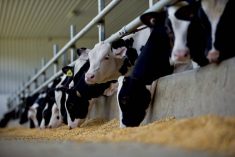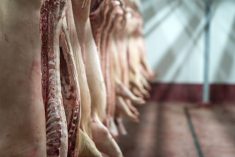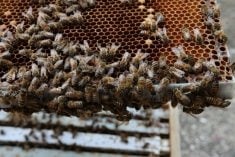With African swine fever top of mind, the federal government plans to more than double the total number of detector dog teams at Canada’s airports within five years.
Agriculture Minister Marie-Claude Bibeau, speaking in Montreal Thursday, announced new funding of up to $31 million over five years to add 24 Food, Plant, and Animal Detector Dog Service (DDS) teams for a total of 39.
The extra handler-and-dog teams are to be deployed to “help prevent illegally imported meat products from entering into Canada,” the Canadian Food Inspection Agency said in a release.
Read Also

B.C. ostriches culled, CFIA confirms
Ostriches on an embattled Edgewood, B.C. farm have been culled after a prolonged legal battle, the Canadian Food Inspection Agency has confirmed.
In all, a Canada Border Services Agency spokesperson said via email, Canada currently has 58 detector dog teams, of which just 15 are dedicated to sniffing out prohibited food, plant and animal products.
The agency has already started the process of procuring dogs and training teams, with the first set of additional DDS teams to be deployed by the end of calendar 2019, CBSA said. The announced funding will also support the “extensive” training required for handlers.
Meat and meat products from countries affected by African swine fever (ASF) “present one of the greatest risks for introducing this animal disease to Canada,” the agency said, and detector dogs “are our best available method to intercept meat products.”
Thus, the agency said, the dogs are the “most effective tool in protecting Canada’s swine population from ASF as well as other animal diseases.”
Meanwhile, CFIA said, CBSA has redirected current detector dog capacity to “key” international airports in Canada, to “better focus on passengers and goods coming from high-risk areas.”
Furthermore, CFIA said, additional signage has gone up at airports “reminding travellers of the requirement to declare all food and animal products at the border to keep foreign animal diseases, including ASF, out of Canada.”
CFIA also said Thursday it’s now considering putting measures in place to prevent infected feed ingredients from ASF-affected countries from entering Canada.
CBSA officers have also “been provided with guidance on applying the penalty of $1,300 to travellers who fail to declare pork or pork products or any other meat when entering the country.”
ASF is a highly contagious viral disease for porcine species and leads to substantial hog production losses in affected regions. Until 2007, the government said, the disease was seen mainly in sub-Saharan Africa but has since spread to several countries in Asia and Eastern Europe.
The virus’ most significant recent spread has been to China, the world’s biggest pork-producing country, which began seeing cases of the disease in its domestic herd last August. It has also since been seen in Vietnam and detected in wild boars in Belgium.
There’s no treatment or vaccine for ASF and the virus is considered very resistant to inactivation. The disease is not considered a human food safety risk and no evidence has yet shown the ASF virus can infect people.
Chinese pork products containing the virus have turned up at other countries’ airports, most recently in packed pork sausage brought into South Korea on March 4 by a Chinese traveller, Reuters quoted Korean ag ministry officials as saying Friday.
South Korea does not import pork products or live pigs from China and the disease hasn’t yet appeared in Korea’s hog herd.
“While there has never been a case of African swine fever in Canada, (CBSA) recognizes the risks posed by travellers and commercial imports,” federal Public Safety Minister Ralph Goodale said in CFIA’s release Thursday.
“Adding additional trained detector dogs will further strengthen their capacity in the years ahead.” — Glacier FarmMedia Network














